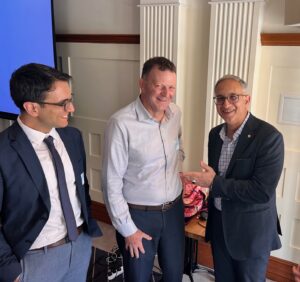Investigating advanced methods for point cloud segmentation and processing to support near-real-time infrastructure and asset modelling, management, maintenance, and resilience
THEME ALIGNMENT
Ubiquitous Sensing, Intelligent and Adaptive Systems
View ThemeINDUSTRY PROBLEM
The purpose of this project is to improve the outcomes and enhance the value of utilising point cloud datasets, from LiDAR and other potential sensors, for near-real-time infrastructure management, monitoring, and resilience. Investigating the potential to optimise time and resource intensive computational and manual processing requirements to extract derived products, such as 3D ground, infrastructure, and change models at the required levels of quality and accuracy.
This research project will investigate the use of advanced methods, including AI/ML, data fusion, and automation processes to improve the speed of processing, efficiency of quality assurance and quality control (QA/QC), and quality of derived products for a series of industry focused infrastructure and asset modelling, management, maintenance, and resilience use cases.
The research project will initially focus on two main objectives contributing to the overall improvement of AI/ML driven point-cloud segmentation industry methods and capabilities:
1. Improving Aerial Point-Cloud Segmentation by addressing imbalanced misclassification.
2. Addressing Point Cloud Noise Segmentation through Artificial Intelligence (AI) / Machine Learning (ML)
This project is directed by the top academic and industry leaders. Academic primary supervisor is A/Prof Jagannath Aryal with a strong track record of advancements in Earth Observation, spatial, and geostatistical analytics. He leads a research group on Earth Observation and AI. Professionally, he leads the GIS, digital analytics and remote sensing, areas of practice of the Geospatial Council of Australia as a national chair. He is also the program director of the Master of Digital Infrastructure Engineering at the University of Melbourne’s Faculty of Engineering and IT.
Along the same token, this research is co-supervised by Prof Abbas Rafabifard, Director of Centre for SDIs and Land Administration, Discipline Leader of Geomatics, and Associate Dean of Sustainability, at the University of Melbourne’s Faculty of Engineering and IT. He is an internationally recognised scholar and engineer who was the former, Chair of Academic Network of the United Nations Global Geospatial Information Management (UN-GGIM).
On the industry side, the project is directed by leading architecture, engineering, geospatial (AEG) and strategic consulting firm, Woolpert, a global leader in aerial, LiDAR and bathymetric capture and data-processing services, among other advanced AEG capabilities. Driven by a forward-thinking culture, and leaders including Partner Investigator Dr. Zaffar Sadiq Mohamed-Ghouse, Vice President & Director Advisory and Innovation, Woolpert and also the Chair of Private Sector Network of the United Nations Global Geospatial Information Management (UN-GGIM) is excited about the potential of this research to deliver impactful and industry leading advancements. The project sponsor, Mr Brian Nicholls, Managing Director, Woolpert Asia-Pacific is pleased to support the research initiative which aligns with Woolpert’s core capabilities as a leader in LiDAR technologies.

